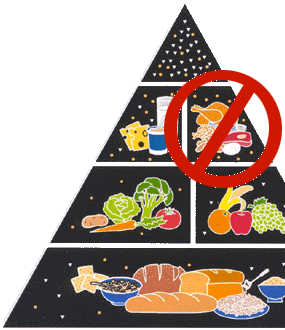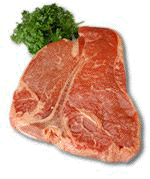|
|
Is Your Health at Steak? |
|
|
|
Most Americans believe that meat is good for you. In fact, there are many dangers and health hazards involved: heart disease, cancer, and poisoning are just a few of them. |
|
|
Beef: it's
what's for dinner. In the United States alone,
more than 250 animals are slaughtered for food every
second. Forty-five percent of all U.S. land is used to
raise animals for food. It's generally assumed that this
meat is okay for our bodies; certainly, most Americans have
trouble imagining meatless main dishes. Curious to find out what most people think, I polled some friends by email. (Click here for complete poll results.) The 32 who responded are people I consider to be generally healthy and well-informed. When asked whether eating red meat once a day is good for you, 56% answered that it's "healthy" or "pretty healthy." 97% said the same of eating turkey, chicken, or fish (69% said it's fully "healthy"). Similarly, only 28% answered that most vegetarians don't eat meat because of health reasons. So it probably comes as a surprise to find out that this assumption is utterly false. In fact, there are actually grave dangers associated with eating meat! "The consumption of animal products has been conclusively linked with heart disease, cancer, diabetes, arthritis, and osteoporosis" (MeatStinks.com). Vegetarians (people who don't eat meat) are much healthier, live longer, and are more resistant to countless diseases than meat-eaters. The jury is in: meat eating is hazardous to your health. |
Studies -->
Introduction | Studies | Fat | Nutrition | Poisons | Conclusion | Bibliography


 But
what, exactly, gives us the impression that meat-eating is
healthy? Is it data from certified studies? No. Is it
long-term observations of our peers' dietary trends? No.
Think about who wants us to buy their products: the
powerful, $60 billion meat industry. Similar to
tobacco companies (except much less well-known), they flood
us with meat propaganda, such as the sentence beginning this
paragraph.
But
what, exactly, gives us the impression that meat-eating is
healthy? Is it data from certified studies? No. Is it
long-term observations of our peers' dietary trends? No.
Think about who wants us to buy their products: the
powerful, $60 billion meat industry. Similar to
tobacco companies (except much less well-known), they flood
us with meat propaganda, such as the sentence beginning this
paragraph.